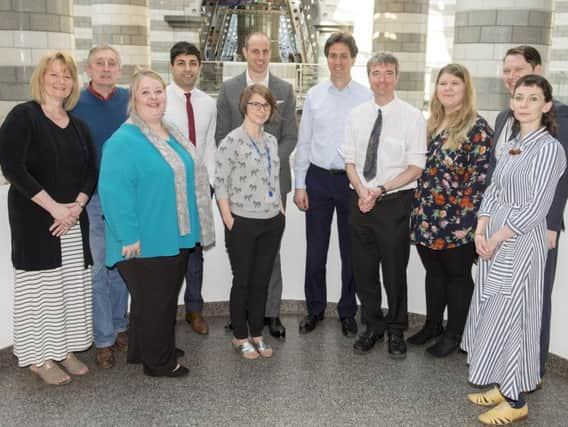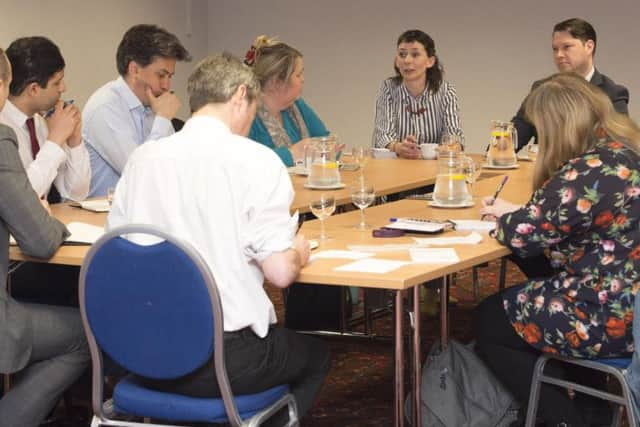'Let's change the the public perception on Doncaster and culture'


Panelists taking part in the Doncaster Free Press round table debate on culture and entertainment held at the Dome this week saw changing the borough's reputation as important, along with doing more work together across organisations, and seeing the value of investment in culture in the borough.
Panelists believe there is a vast range of culture and entertainment taking place in the borough, but that many people are not aware of the depth of activities.


Advertisement
Hide AdAdvertisement
Hide AdOur panel was made up of Nick Stopforth, head of libraries and culture at Doncaster Council; Ed Miliband, Doncaster North MP; Sally Lockey, project director, Right Up Our Street; Sian Dudley, head of marketing, Cast; Nik Pey, marketing manager, Doncaster Culture and Leisure Trust; Nikki Griffiths, director of sales, Doncaster Racecourse; Dominic Gibbs, Director, Diamond Live Lounge; and John Willis, promoter, Roots Music Club.
How can we improve the range of cultural activities on offer in Doncaster?
Dominic Gibbs: I think first of all its about linking up together. I think we should work together more.
Sally Lockey: That's what we're trying to do. We're running, the DN Festival and then the Festival of Light in November. The thinking is we take cultural activity that's going on across the borough and put it on a stage together, creating participatory activities. The hope is that is not just showcasing what's going on, but is increasing participation as well, breaking barriers down so people can have a bit of a try without signing up to anything.
Advertisement
Hide AdAdvertisement
Hide AdDG: I think people put a level on the town where they think it is, The town has so much potential and I think the one thing that lets us down is people's mindset.
Nik Pey: Culture is a massive part of our business at DCLT but it's not about individuals, When you look at the culture of a town you need to look at how we work as a team. We might host an event that's brilliant. As a team I think we can create quite a lot.
Nikki Griffiths: I think we need that long term plan. I know we've talked about the DN Weekend, a month of culture, and the year of culture in 2020. I think there's a cultural challenge for us as a town - where do we want to be and where do we want to get to?
Nick Stopforth: We need to know what our aspirations are. I think clearly there is an opportunity here to develop great arts and cultural programming here and we've got a platform for that. At the same time we need to raise the aspirations of our population, so when people see great arts and culture, or just the culture that takes place on their doorstep, they know that it's for them, and can be shaped by them as well. Access is crucial and we've seen on many occasions that we have worked with children and young people and they have said they want to take part in arts and culture in Doncaster, but can't afford it, or can't get to it, or it's not for us, so there is definitely something around the mindset and the opportunity, and that opportunity may be about having a variety of events in the town centre, but also taking that programme right onto people's doorsteps, so they can't escape it, it's so easy to access.
Advertisement
Hide AdAdvertisement
Hide AdJohn Willis: We need to change the cultural perception of Doncaster as a place. I've seen frustrating circumstances where there will be good things going on in Doncaster that we've organised, then you'll go to an event in another town and lots of people from Doncaster are there, but not here. A cultural turnaround won't happen over night but it would certainly make a difference, where the perception is Doncaster's a good place - and it is.
NG: You look at Hull and the city of culture. Liverpool had something similar, and at the time, it may not have been what people would have expected. We need to change that perception.
Sian Dudley: Colour of Light last year had an audience of 4,000. That's really great, and our audience has really grown vevery year. We've just reached the 100,000 mark for the last financial year. The year before that it was 90, the year before that it was 84.
Ed Mliband: I think should we be incredibly proud of the potential and what is happening. What is happening at Cast, what's happening in terms of a new museum and gallery in 2020, I think all of that is a massive opportunity for all of us, I think its important that we see culture as the full range of thing. it is all about making Doncaster an exciting place to live and I agree that partly we've got a perception change job to do, internally as well as externally, because there is quite a lot of exciting stuff happening. We need more of it, but actually if people knew half the stuff was going on they'd change their perception, and it would change externally as well.
Advertisement
Hide AdAdvertisement
Hide AdSL: In November we've programmed an event called the Museum of the Moon, to be installed in the Minster, The Museum of the Moon is about 7ft, in diameter, and is an exact replica of the moon, illuminated internally. It's been to some massive locations, and we have it for a week in Doncaster Minster. We are going to have arts events performed underneath that.
JR: What's the ticket price?
SL: Free
JW: I'm not against things that are free, but everything has a value and a cost. The changing of people's perceptions is also about value. We work hard to run unsupported live music events in Doncaster. We get international artists. It's niche. I'm not against free live entertainment but when it's funded by an outside organisation, when the finding stops, the activity stops. You've got to get the people to realise that if there something good that's on, there's a ticket price now and again.
NP: We do live music here and the Leopard. You've got to credit the artist and its free people don't expect it to be as good. putting some sort of a price on an event makes some sense, but I don't disagree with free events. That's what we provide with open mike nights, so people can enjoy a free night out andlive music. I don't agree with making everything free.
JW: I'm not against things being free, but its how you get people to cross over from something that does not cost them anything. If something has a value, there's a cost.
Advertisement
Hide AdAdvertisement
Hide AdSD: Everyone has the right to access arts and culture and some people who access things at Cast that we subsidise or make free or offer funding to enable it to be free, will never pay for that. But just because you're an asylum seeker, a refugee or a single mum that doesn't mean that you shouldn't have access to the arts and we'll continue to provide those things.
NS: Things that are provided for free are often about equality of access and pricing can help support that. People often are prepared to spend. We've seen examples with gigs where people pay what they want to pay and often end up paying more than the ticket price.
SD: There seems to be a shift in the way we see arts and culture in Doncaster. There is a fundamental case that the arts and culture improves people and places and contributes towards the economy. It wasn't trains and shiny buildings that transformed Hull, it was arts and culture. It transformed it overnight. Seeing the arts as serving Doncaster is more than just putting on a nice arts and craft workshop on for kids, its serious stuff and I think that now is the time. To improve the offer, I think we need to be better at seeing culture and entertainment as an investment, searching for investment and funding opportunities and local people and local businesses investing back in the arts and culture to develop the place where we live work and play and stay.
EM: What Hull has shown is that this is core economic value as well as social value and cultural value and I think it's a big opportunity to show that it makes economic sense and can be provide jobs and employment attract people into Doncaster. I hear too many people saying they passed through Doncaster on a train. We want them to stop. Part of wanting them to stop is it being a place you want to come to and I think we know there are lots reasons for people to stop.
Advertisement
Hide AdAdvertisement
Hide AdNS: We've got an international class racecourse, and international class theatre and international class growing wildlife park. The base is so strong in terms of the institutions we have, it is about how we connect those and develop a momentum through our arts and culture.. It's about how we tell people.
EM: I think the national institutions that often only serve London, should be doing more to serve places including Donaster. One thing I see as my responsibility is using my contacts to say to them you've got a responsibility to reach out. Locally generated culture is as important but it's also the case that people in Doncaster should have access to the theatre that people in London have access to. That is part of them doing their bit.
SD: There is bringing Doncaster to the world, and bringing the world to Doncaster. - there are two sides to it. Cast is going to tour its very first touring production in September, which is really exciting. We need to see things inwardly but also get it out there a bit more.
NP: Places like Cast are great venues, and looking back we've come a long way in 10 years. Where will we be in another 10?
Advertisement
Hide AdAdvertisement
Hide AdJR: Years ago we had the festival of Great Britain. Why don't we have the festival of Doncaster bringing this disparate elements together?
NS: That's our ambition for 2020, with programming around a year of culture. We want to bring these disparate parts which are becoming more closely co-ordinated, and started to talk with one voice, working at a local level and bringing national institutions and national quality in as well, to do something really cohesive across the borough, so that is in the pipeline."